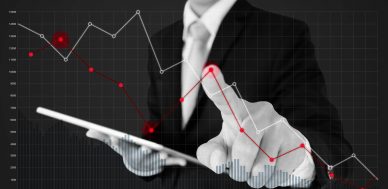Trump’s Trade and Tariff Wars Are a Mask to Hide the Real Risk of an Economic Crisis
Trade disputes could trigger a global economic crisis. Any hope that President Donald Trump was bluffing to secure better trade terms with China has vanished.
The veritable tit-for-tat exchange of tariffs and duties between the two largest economies in the world, the United States and China, has grown into something far more serious and insidious.
It’s not just a temporary dispute. It’s the start of a veritable trade war. And these have rarely ended without at least some shots being fired.
Those shots are helping create a global economic crisis. Trump has even intimated that he would pull the U.S. out of the World Trade Organization (WTO) unless it—an international body and referee—changes the rules of the game in favor of the United States.
At the very least, this has triggered anxiety. Ultimately, it could grind the world economy to a halt. (Source: “Trump threatens to withdraw from World Trade Organization,” CNBC, August 30, 2018.)
So far, Trump’s tariffs against China and the European Union have had mixed results.
Stocks have continued along a bullish path throughout the summer. Occasionally, they have taken a break with some slight bearish snaps.
Yet, as precarious as the trade disputes are in and of themselves, the real danger comes from what the trade disputes are masking. The biggest threat of an economic crisis, actually, comes from debt.
And while Washington, Berlin, and Beijing are targeting tariff shibboleths, the Trump presidency has accumulated a massive amount of debt. (In fairness, its predecessors were not better.)
Who Cares about Debt When We Have Growth?
The financial burdens are growing. Trump appears to be one of those “I don’t give a flying…” kind of White House occupants. And America’s debts, given the primacy of the U.S. dollar, affect the whole world.
That’s why it’s impossible to speak of an economic crisis that isn’t global when it stems from a failing U.S. economy.
Still, the secret behind Trump’s “If it is Monday, then I’m going to impose a 25% tariff on this here Chinese product” act comes from an apparent belief, if not expectation, that the tariffs can help pay down the debt.
In other words, the Trump administration has taken one risk to exacerbate another. And all this is occurring within the context of vastly lower corporate and high-net-worth-individual taxes.
That’s why we can experience the paradoxical situation of a hyper-bullish stock market amid huge debt and rising risks of a global economic slowdown.
How Long Can the Charade Continue?
The idea is that economic growth—that is, gross domestic product (GDP)—could help offset the combined effects of the tax cuts and the alleged higher spending on infrastructure (and the military, even if few politicians, regardless of political affiliation, would admit it).
The fact remains that the ballooning public debt has become the most intractable challenge for the U.S. economy—and, therefore, for the world economy.
Debt could certainly affect stocks, of course. The 2008 financial crisis and the stock market crash of 1929 were crises of debt. Debt is the crisis.
Even the strong growth of the past few years has piggybacked on borrowing. It was borrowing, in the form of quantitative easing, that pushed the U.S. national debt under President Barack Obama to more than double the previous amount. It went from some $8.0 trillion to almost $20.0 trillion.
That was in 2016. Today, total U.S. debt has reached and passed the $21.0-trillion mark. To sustain the present pace of growth, we have little choice but to continue borrowing.
Therefore, no amount of extraordinary performance will reduce the risk of a deep economic crisis.
Debt Doesn’t Care if Democrats or Republicans Fail to Pay Attention
This is hardly a partisan issue. Nobody in Washington cares about the debt.
As Trump plays with tariffs and debt increases, the Federal Reserve has been busy raising interest rates.
It matters little that companies are reporting higher growth (again, fueled by lopsided tax cuts rather than organic demand).
Sooner or later, the heavily indebted corporations will have to justify those lofty valuations on Wall Street. It’s going to cost them more to service the already significant debt burden many amassed in the post-2008 crash years.
Sooner or later, investors and analysts will also catch on that higher debt financing costs are the equivalent of heavy turbulence for a small airplane. Simply put, higher debt financing will cut earnings and trigger a stock market crash in the process.
And it’s going to cost families and individuals more to pay off student loans, mortgages, car loans, and credit cards.
Everyone Is Boarding the “Outstanding Debt Express”
Those who have managed to profit from their portfolios will have to decide how long the bull market will last.
The chance that investors will catch on to the destructive influence that outstanding debt exercises over their portfolios might certainly trigger heavy profit-taking.
Indeed, it has become ever more apparent that the U.S. economy has already achieved its peak growth.
The down phase has started and it will become more evident in the next few months.
It may not happen today or tomorrow. It may not happen next week or even next month. But it’s inevitable that the United States will experience another economic crisis, which will also spark destructive consequences for the world.
